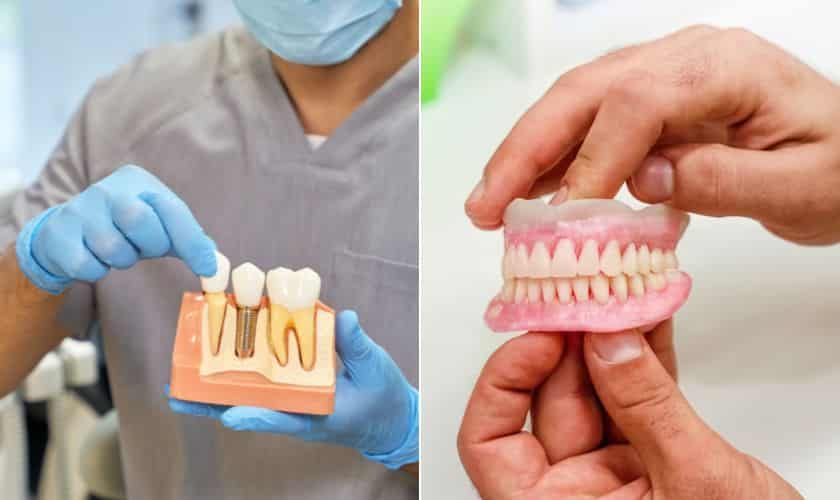When faced with tooth loss, choosing the right solution is essential for restoring your smile and oral function. Dental implants and dentures are two popular options, each with its own set of advantages and considerations. This article aims to compare dental implants and dentures to help you make an informed decision. We will explore the benefits, drawbacks, and suitability of each option based on various factors, such as cost, durability, maintenance, and comfort. By understanding the differences between dental implants and dentures, you can work together with your dentist to select the superior option that best meets your specific needs and preferences.

Dental Implants: Advantages and Considerations
Advantages of Dental Implants:
1. Permanent Solution: Dental implants are a long-lasting tooth replacement option that integrates with the jawbone, providing a stable and permanent foundation for artificial teeth.
2. Improved Aesthetics: Dental implants look and feel like natural teeth, enhancing the appearance and restoring the patient’s smile, which can boost confidence and self-esteem.
3. Enhanced Functionality: Unlike traditional dentures, dental implants allow patients to eat, speak, and chew comfortably and efficiently, as they mimic the function of natural teeth.
Considerations for Dental Implants:
1. Surgical Procedure: Dental implant placement requires a minor surgical procedure, which may involve a healing period and potential discomfort.
2. Bone Density and Gum Health: Sufficient bone density and healthy gums are essential for successful implantation, and patients with certain dental conditions may require additional treatments.
3. Cost: Dental implants are generally more expensive than dentures initially, but their longevity and durability make them a cost-effective option in the long run.
Dentures: Advantages and Considerations
Advantages of Dentures:
1. Non-Invasive: Dentures are a non-surgical and relatively quick tooth replacement option that does not require invasive procedures.
2. Affordability: Dentures are generally more budget-friendly compared to dental implants, making them a more accessible option for some patients.
Considerations for Dentures:
1. Adapting to Dentures: It may take some time for patients to adapt to wearing dentures, and they might experience initial discomfort or difficulty with speech and chewing.
2. Lifespan and Maintenance: Dentures might need periodic adjustments or replacements over time due to wear and tear, and proper maintenance is essential for their longevity.
Comparing Dental Implants and Dentures
1. Stability and Function: Dental implants offer superior stability and function compared to dentures. They are anchored into the jawbone, providing a strong and stable foundation for biting and chewing, similar to natural teeth. Dentures, on the other hand, may have some limitations in terms of stability and chewing efficiency.
2. Longevity: Dental implants have a significantly longer lifespan compared to dentures. With proper care, dental implants can last a lifetime, whereas dentures may need replacement every 5-10 years.
3. Bone Health: Dental implants stimulate the jawbone, promoting bone health and preventing bone loss. Dentures do not provide this stimulation, and over time, the jawbone may deteriorate, leading to changes in facial appearance.
4. Aesthetics: Dental implants offer a more natural and aesthetic appearance as they closely resemble real teeth. Dentures may have a more artificial look, especially if not properly fitted or maintained.
Ultimately, the choice between dental implants and dentures depends on individual preferences, oral health, and budget considerations. Consulting with a dentist can help determine the best option for each patient’s specific needs.
Choosing the Superior Option:
1. Oral Health: Dental implants promote better oral health as they do not rely on neighboring teeth for support. They prevent bone loss and preserve the natural structure of the jawbone, whereas dentures may lead to bone resorption and gum irritation over time.
2. Functionality: Dental implants offer superior functionality, allowing individuals to eat and speak with confidence, similar to natural teeth. Dentures may come loose or cause discomfort, affecting eating habits and speech clarity.
3. Long-term Cost: While dental implants may have a higher upfront cost, their longevity and minimal maintenance can make them a more cost-effective option in the long run compared to dentures, which may require periodic adjustments or replacements.
4. Confidence and Comfort: Dental implants offer a secure and comfortable fit, eliminating concerns about dentures slipping or falling out. This enhanced stability can boost confidence and improve the overall quality of life.
5. Aesthetics: Dental implants provide a more natural appearance, seamlessly blending with the remaining teeth. They do not cover the palate like dentures, allowing for a more authentic smile.
Ultimately, the decision between dental implants and dentures should be based on individual needs, overall oral health, and preferences. Consulting with a dentist can help determine the best-suited option for achieving optimal dental function, aesthetics, and long-term satisfaction.
Source : DentaVacation
In conclusion, both dental implants and dentures offer viable options for tooth replacement, each with its own set of advantages and considerations. Dental implants provide a more permanent and natural-looking solution, while dentures offer a more affordable and non-invasive option. The choice between the two depends on individual needs, preferences, and oral health conditions. Consulting with a qualified dentist can help determine the superior option for each individual’s specific situation.
Some FAQs on this topic:
1. Are dental implants painful to get?
The dental implant procedure is typically performed under local anesthesia, ensuring minimal discomfort during the process. Patients may experience some soreness or mild discomfort after the surgery, which can be managed with over-the-counter pain medications prescribed by the dentist.
2. How long do dental implants last?
With proper care and maintenance, dental implants can last a lifetime. They are designed to be a durable and permanent solution for tooth replacement, making them a long-term investment in oral health.
3. Will dental implants look natural?
Yes, dental implants are designed to closely resemble natural teeth in appearance. The crown or artificial tooth is custom-made to match the color, size, and shape of the surrounding teeth, resulting in a natural-looking smile.
4. Can dentures be replaced with dental implants?
Yes, dentures can often be replaced with dental implants to provide a more secure and permanent solution. The dentist will assess the individual’s oral health and determine if they are a suitable candidate for dental implants.
5. Is the cost of dental implants covered by insurance?
The coverage for dental implants may vary depending on the individual’s dental insurance plan. Some dental insurance plans may provide partial coverage for implant procedures, while others may not cover them at all. It is best to check with the insurance provider beforehand to understand the extent of coverage.




